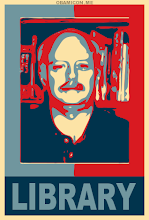There are some difficulties, however, with collaboration. For whatever reason, a teacher can work with a teacher librarian successfully, but then return to their old ways of teaching sans collaboration. What's a teacher librarian to do?
To begin, teacher librarians must accept that their job involves leadership. A good TL must be guided by a vision for what is possible and must have an administrator who will support that vision. The book describes Loertscher (2000)'s premise that collaborative planning is key to having a successful library program. Importantly, you must link academic achievement to your library program.
Collaboration can be difficult for two reasons:
- Internal elements (over which librarians might have some form of control); or
- External factors (such as district policies, funding issues, and the like).
Clearly, it is easier to deal with the first than the second. Local issues can be solved locally.
There a number of factors in leading collaborative efforts. They include:
- The principal's mental model. How the principal views your position has much to say about how successful you can be.
- The teacher librarian's knowledge of the curriculum. Teacher librarians need to be able to provide support even in areas where they do not have teaching experience.
- Teachers' prior knowledge and experience. Many teachers have a preconceived notion as to the job of a teacher librarian and it can be difficult to convince them otherwise. That being said, it is the TL's job to do so.
- Ability to see the big picture. It is important to be able to view the curricular needs of the whole school and not one tiny part.
- Belief in the ability to lead. The teacher librarian needs to view their position as a leadership one. Affecting change means providing leadership.
There are three qualities that a successful teacher librarian must possess. They are the ability to be patient, an ability to know when to encourage others, and empathy to what occurs on the day-to-day in a teachers classroom.
There are a number of principles and stategies necessary if you wish to lead successful collaborative efforts. They include:
- Create/take advantage of opportunities. Determine how you can take advantage of situations to promote collaboration
- Acknowledge agendas. What is it that the partners want to get out of the collaboration.
- Discuss expectations. While in a perfect world, teacher librarians could map out how a collaboration should work, the classroom teachers and administrators often have their own expectations.
- Determine goals and objectives. What does the ending point look like?
- Set priorities. What is most important to achieve and what is less so?
- Create teams. While many collaborations are with two partners, it does not need to be so.
- Keep team focused on the mission. Sometimes people can drift off into other projects, programs, and goals. It is the teacher librarians job to schedule and keep focused.
- Evaluate. Did it work? Did it not work? Why?
- Document evidence. Being able to produce evidence of success is powerful both for the teacher you worked with, but also for other teachers and for administrators.
- Reward positive results. Being able to mention in front of administrators what a wonderful collaboration you had with Teacher X goes a long way toward getting others to work with you.
- Lead professional growth. You should be a part of the professional development opportunities for individual teachers and for your staff.
- Share leadership. While you need to provide direction, you do not need or is it desirable that you are the sole leader.
Related articles
Montiel-Overall, P. (2009, September). Teachers' perceptions of teacher and librarian collaboration: Instrumentation development and validation. Library and Information Science Research (07408188), 31(3), 182-191.
Forrest, M. (June 2009). Good Practice in Action. Information Scotland, 7(3), 4-4.

Basically, a school librarian can't be shy and secluded right?
ReplyDeleteOne of the things I like about going to TL meetings and the CSLA conferences is seeing all of the other out-going, gregarious TLs that are willing to implement, collaborate, advocate and train others to see what they see.
A great principal/school board/superintendent can all be be great to have too, but those are people who can all be educated too, and can be wowed into believing in a great library program.